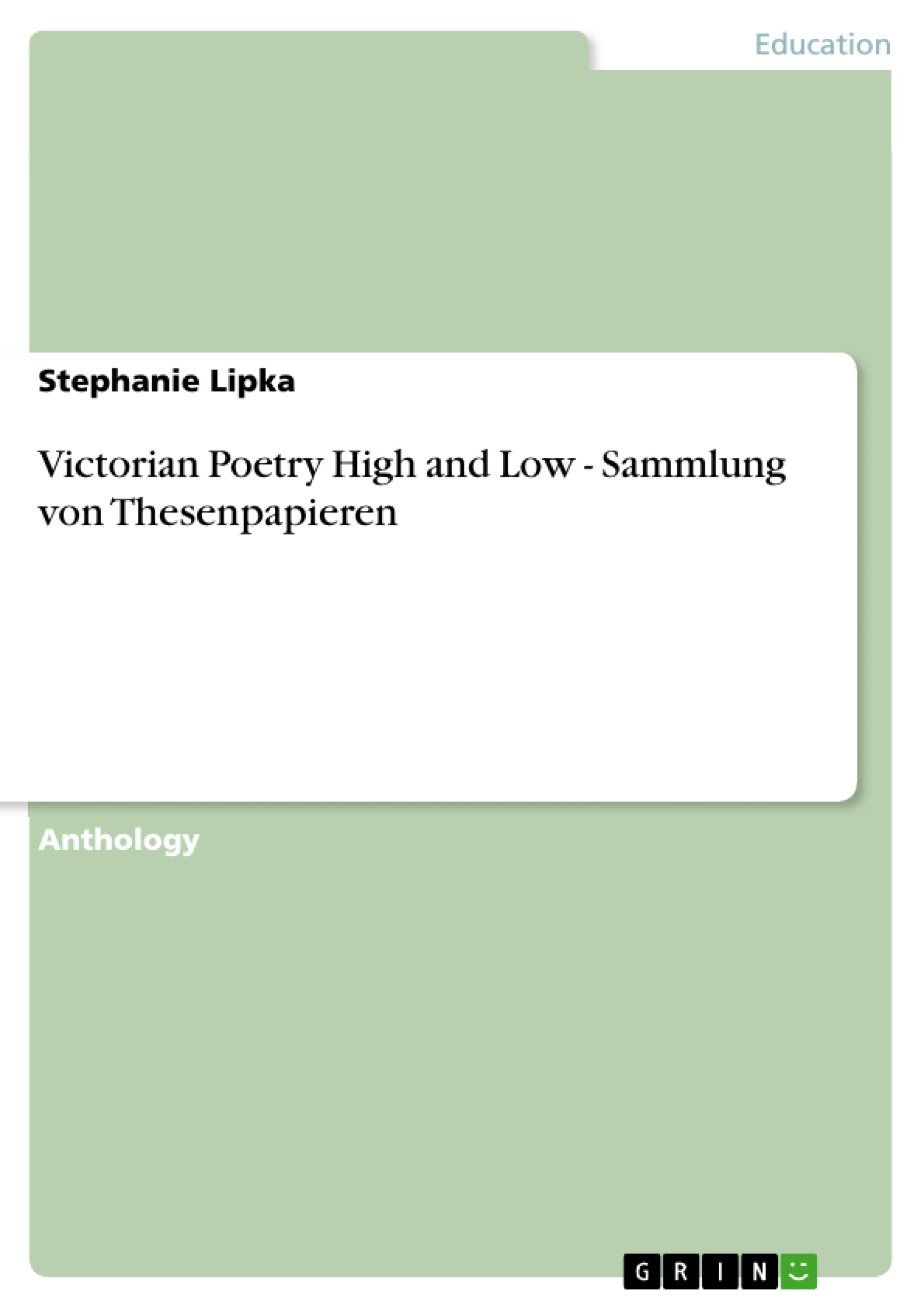Bei dieser Sammlung handelt es sich um Thesenpapiere des Hauptseminars "Victorian Poetry High and Low", welche der Vorbereitung der Seminarsitzungen dienten.
Die thematischen Schwerpunkte der Ausarbeitungen liegen auf Religion und Aberglaube, Exotik, Krieg und Frieden, Unterhaltung, industrieller Revolution und Imperialismus. Neben anderen werden Werke von Matthew Arnold, Robert Browning, Christina Rosetti und Gilbert & Sullivan analysiert und interpretiert und das Viktorianische Zeitaltern aus modernen Blickwinkeln beleuchtet.
Inhaltsverzeichnis (Table of Contents)
- Victorian Poetry in a Nutshell?
- Predecessors
- The Promised Land
- Religion and Doubt
- Catholicism
- Catholicism High and Low, Now and Then
- Medieval
- Arnold and his Sidekick
- Orientalism
- War and the Army (I)
- War and the Army (II)
- Light Verse
- Dialect
- The Industrial Muse
- Music Hall
- Shakespeare
- Famous Last Words
Zielsetzung und Themenschwerpunkte (Objectives and Key Themes)
This collection of thesis papers aims to analyze and explore various aspects of Victorian poetry, focusing on its diverse range of themes, styles, and contexts. The papers delve into the works of prominent Victorian poets, examining their individual approaches to love, death, religion, war, and social issues.
- The representation of love and death in Victorian poetry
- The exploration of religion and doubt in the Victorian era
- The influence of Catholicism and medievalism on Victorian poetry
- The portrayal of war and the army in Victorian literature
- The use of light verse, dialect, and music hall traditions in Victorian poetry
Zusammenfassung der Kapitel (Chapter Summaries)
The first session, "Victorian Poetry in a Nutshell?", introduces the concept of Victorian poetry through an analysis of Robert Browning's "My Last Duchess". This poem, presented as a monologue, explores themes of jealousy, possessiveness, and the ambiguous nature of the speaker's actions.
The second session, "Predecessors", examines the influence of Romantic poets on Victorian poetry through an analysis of John Keats' "Ode to a Nightingale". Keats' poem, characterized by its lyrical style and exploration of nature's beauty, presents a contrasting perspective on death as an escape from the harsh realities of life.
The third session, "Religion and Doubt", delves into the complex relationship between faith and skepticism in the Victorian era, using Matthew Arnold's "Dover Beach" as a case study. Arnold's poem presents a melancholic view of the world, juxtaposing the beauty of nature with the uncertainty of belief and the erosion of traditional values.
Schlüsselwörter (Keywords)
The main keywords and focus topics of this collection of papers are: Victorian poetry, Robert Browning, John Keats, Matthew Arnold, love, death, religion, doubt, Catholicism, medievalism, war, the army, light verse, dialect, music hall, and social issues.
Frequently Asked Questions
What are the main themes of Victorian poetry discussed here?
Key themes include religion and doubt, exoticism (Orientalism), war, the industrial revolution, and social issues like imperialism.
Which poets are featured in this collection of thesis papers?
The collection interpret works by Matthew Arnold, Robert Browning, John Keats, Christina Rosetti, and Gilbert & Sullivan.
How is religion portrayed in Victorian poetry?
It is often shown as a conflict between faith and skepticism, as seen in Matthew Arnold's "Dover Beach," reflecting the era's religious doubt.
What is the "Industrial Muse"?
This term refers to poetry inspired by or reacting to the Industrial Revolution, highlighting the impact of technology on society and literature.
What is the significance of Robert Browning's "My Last Duchess"?
It is analyzed as a classic dramatic monologue exploring jealousy, power, and the ambiguous nature of the speaker's past actions.
- Quote paper
- Stephanie Lipka (Author), 2001, Victorian Poetry High and Low - Sammlung von Thesenpapieren, Munich, GRIN Verlag, https://www.grin.com/document/126035



